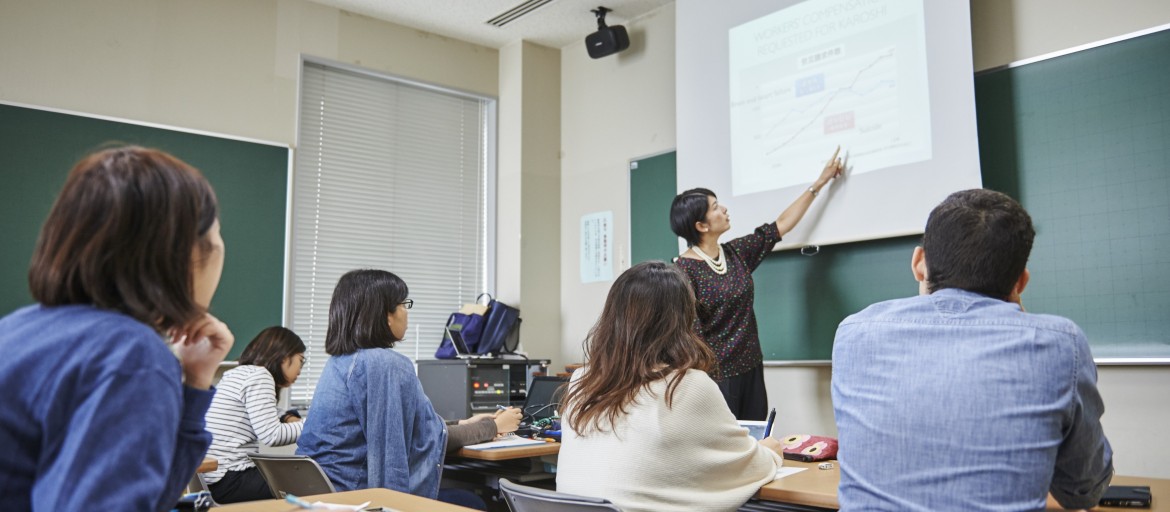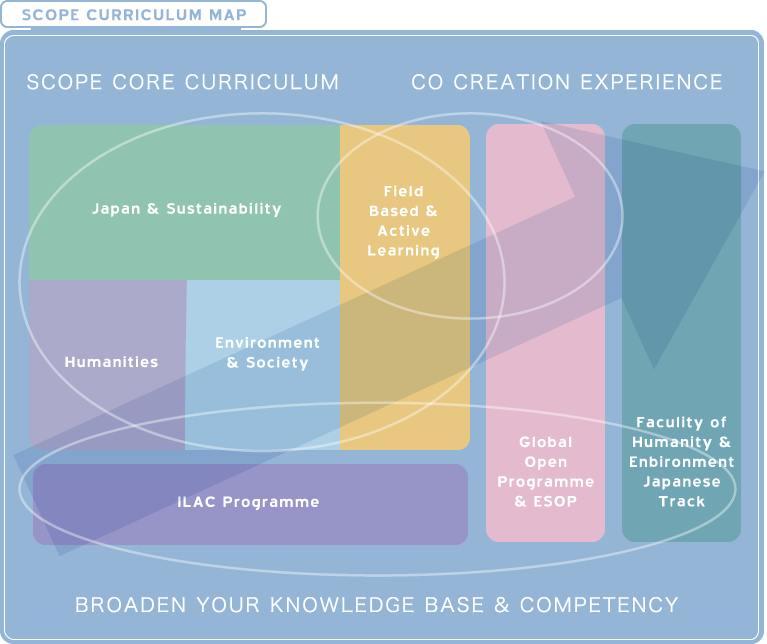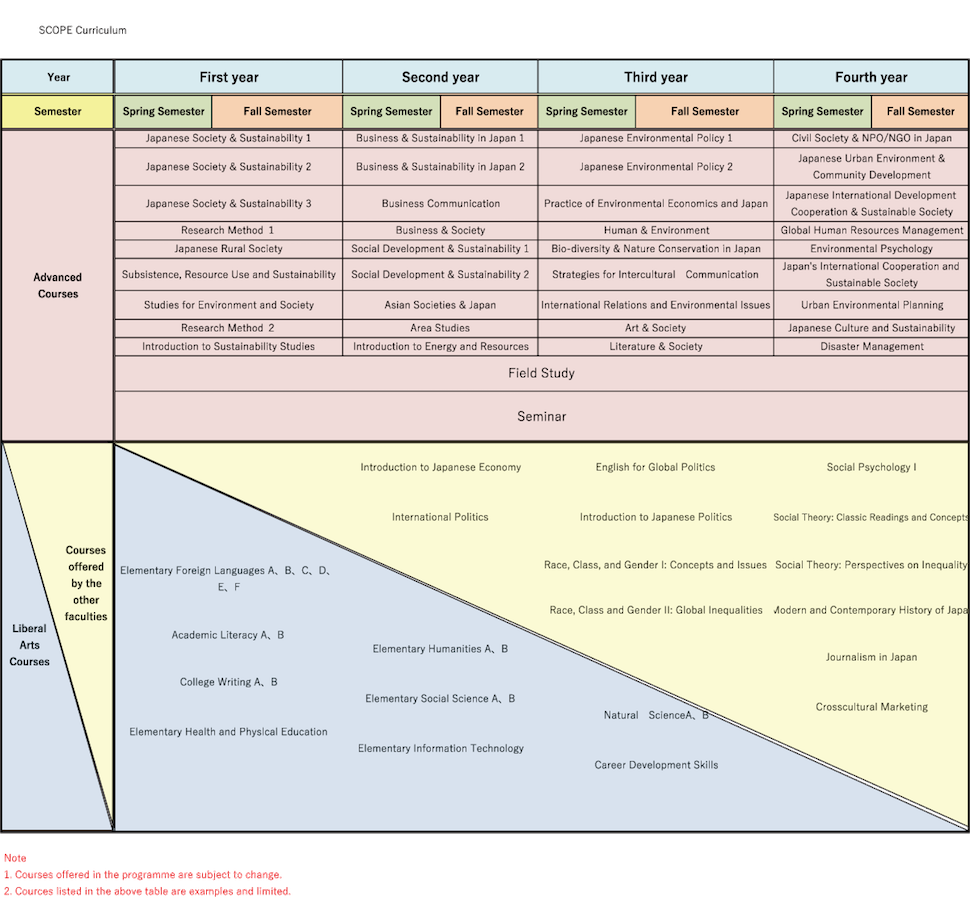




Sustainability is not just related to environment issues, rather it is a multi-faceted field derived from environmental quality, community stability, economic and social equity, and other indicators of sustainability.
Sustainability is founded on the integration of an understanding of the natural sciences regarding the threat of environmental problems and an understanding of the social and behavioral sciences regarding the social, economic, cultural and political factors which underlie the problem, as well as providing insights into potential solutions. Sustainability also draws upon historical perspectives, ethical sensibilities, and the creative imagination of the arts and humanities to shed light onto what has led us to this point, and to determine ways of dealing with the problems that have arisen.
Therefore, SCOPE provides a curriculum which integrates knowledge and methodologies from the humanities, social sciences, economics, natural sciences, and arts to provide a roadmap for students that can be applied to the design, selection, and implementation of sustainable policies, practices, and strategies.
In SCOPE, students are able to select and take courses from three main categories of the program.
This is the cluster of core courses in SCOPE offered by the Faculty of Sustainability Studies. The courses are rooted in various disciplines and at the same time united in the search for a sustainable society.
SCOPE offers well balanced, wide ranging core courses from the humanities, economics, sociology, anthropology to natural science, astronomy, ecology and natural resources, in order to comprehend and create solutions for the social and environmental challenges we are currently facing and may face in the future. Through inter-disciplinary studies with a central interest in sustainability, students will be able to foster a sense of value and acquire coordinated knowledge of the field.
In addition, SCOPE provides field-based and active-learning opportunities so that students will be able to apply what was learned in the classroom in terms of the knowledge, skills, and values of these disciplines to our communities and society through hands-on experiences off-campus. These learning opportunities will provide students “real life” exposure for sustainability challenges.
This category offers basic liberal arts courses, which will be the foundation of all academic research and practical application in society. ILAC courses are by nature, broad and diverse, rather than professional and specialized. Choosing courses from many disciplines enables students to cultivate a wider world view. This not only gives students a diverse knowledge of subjects but also helps them gain a strong knowledge foundation in a wider range of academic fields which can deepen their understanding of core courses.
ILAC courses also allow students to gain essential academic skills such as analytical and knowledge-building, evaluative and critical thinking, effective oral and written communication, critical and reflective reading, foreign language and cross-cultural knowledge, information literacy, ethical decision-making, and so on. If students hope to improve their Japanese language proficiency, they will also be able to take Japanese language courses offered beyond ILAC’s courses as well.
Hosei University’s educational goal is to develop internationally competent students who can contribute to a sustainable global society. In order to achieve this goal, Hosei University established an open program for specialized courses taught in English by mobilizing educational resources from the entire university (i.e., 15 faculties) along with ESOP (Exchange Students from Overseas Program).
Through this university-wide initiative, an open program for specialized courses is available through which students are able to study various subject areas more in depth if they have a specific interest. Alternatively, students may discover a renewed interest in taking courses from the diverse range that are on offer. As the program is open university-wide, students will have greater opportunities to interact with students from other faculties and programs, including Japanese students.
In addition, ESOP offers many diverse courses on Japan-related topics including Japanese language in English to provide meaningful academic opportunities for exchange students. Through ESOP, students will be able to deepen their understanding of various aspects of Japanese society as well as develop intercultural communication skills in both Japanese and English. The courses are usually offered as smaller classes and will enable greater interaction among students and professors.
Shown below is a schematic sketch, which indicates how students will develop basic academic knowledge and competence through liberal arts in the first half of students’ academic years. It also indicates that SCOPE core courses, the GO program and ESOP will deepen students’ specialized interests and knowledge. At the same time, students will have opportunities for various Co-creative experiences in interactive courses or courses open to students from other programs.

SCOPE also offers different opportunities for study such as Seminar, Field Workshop and Co-creative Workshop courses, so that students will be able to pursue their academic interests and future career. “Seminar” is for further study of a specific academic interest under the guidance of experienced professors, whereas in Field Workshops, students will be out of the classroom and meeting people who deal with relevant issues in various fields. Seminar also offers a first-year seminar for the smooth introduction of SCOPE. Co-creative Workshop provides students with a collaborating active learning environment with students from the Japanese-based Faculty of Sustainability Studies in English. Through these interactive and practical courses, students will be able to better understand how to relate classroom activities to real-life issues.
Through the SCOPE curriculum, students will have a truly interdisciplinary understanding of various dimensions of sustainability, both from a global and local perspective. In addition, they will become fluent in articulating how sustainability issues relate to matters of the environment, the economy, and social equity; and demonstrate critical thinking, reading, writing, and research skill proficiency. It might be appropriate to say that SCOPE is preparing its students with knowledge, insights, skills, and strategies to help steer communities, organization, society, and the world toward a more sustainable future.

By acquiring the prescribed credits, “Bachelor of Arts (Sustainability Studies)” will be awarded to students who have reached the following levels:
1. Practical language proficiency and basic capability such as information processing, subscription reading and writing, and communication are acquired.
2. Students acquire a wide variety of liberal arts education on a sustainable society.
3. Students acquire an interdisciplinary and comprehensive expertise on a sustainable society.
4. Students are able to consider concrete issues concerning sustainability, make an appropriate judgment and express them through sentences and dialogue.
5. Students acquire the ability to sympathize with diverse people and the attitude to learn autonomously from the field site
